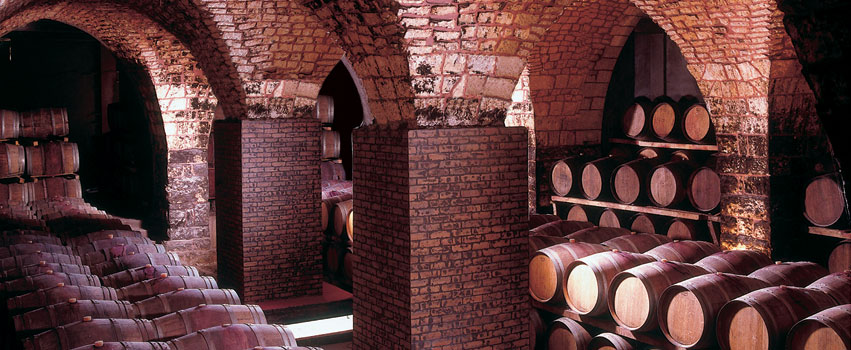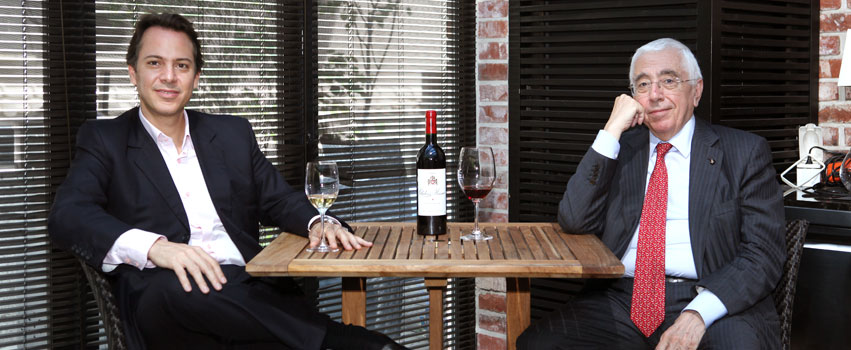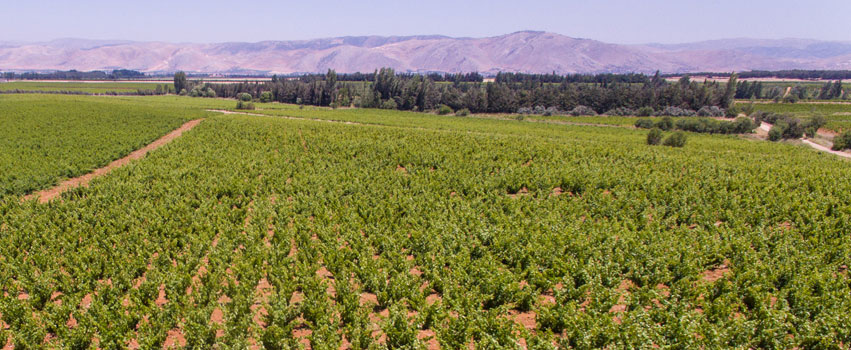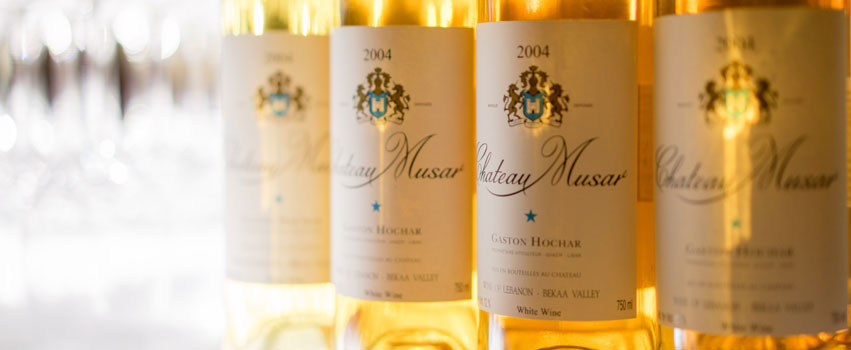
What influences your decision to pick up a particular bottle of wine? Some have favorites they come back to year after year. Others are more adventurous, trying new varieties as often as possible. Many people, as research has revealed, select a wine based solely on its label. And then there are wines with a history—those that come from well-known wineries, celebrated for their quality, consistency or individuality.
This is the story of a Lebanese winery you’ve likely never heard of, but it’s considered one of the finest in the world. And now, the wines of Chateau Musar are finding their way to Peoria.
An Ancient Tradition
“We’ve always had wine in Lebanon,” observes Marc Hochar (pronounced hoe-shar), grandson of Chateau Musar founder Gaston Hochar, whose family of ancient French lineage arrived in Lebanon in the 12th century. Along with his brother and other family members, he is part of the third generation that now runs the winery.
The earliest evidence of the presence of wine in the eastern Mediterranean dates back to 8000 BC. Over the centuries, humans learned to cultivate the wild grapes they found growing in this region, which includes Georgia, Armenia, Azerbaijan, Syria, Iraq, Lebanon and parts of Turkey and Iran. “The real contribution of the ancestors of Lebanese people—who were called the Phoenicians—was that they produced wines in that area from approximately 3000 to 1000 BC,” Hochar explains. “They sold wines to pharaohs and to the people who would become the Greeks.”
After the Muslim conquests of the seventh and eighth centuries, alcoholic beverages were prohibited by law, and the production of wine in what is now Lebanon came to a halt. “This is when other regions stepped up—Italy, France and Spain—and produced and developed wine,” Hochar continues. “They got the title of what we call ‘Old World’ wines. Although we are ‘new’ to the market—because we only started producing wines again in the 1900s—Lebanon is not ‘New World.’ I categorize us as an ‘ancient wine.’”
The first real resurgence of wine in Lebanon came via Christian monks who started producing in 1857. More than 70 years later, Gaston Hochar returned from a visit to the Bordeaux region of France and planted his first vineyard. “This is the genesis of Musar,” Hochar recounts. “He started from scratch.”
Gaston Hochar established his winery inside an 18th-century castle overlooking the Mediterranean in the town of Ghazir. “I don’t know exactly how he did it, to be honest,” admits his grandson with a chuckle. “He was friends with Ronald Barton from Château Langoa-Barton [a prominent winery in Bordeaux, France]—I assumed he had help from him. He also had… locals in Lebanon who knew a little bit how to make wine. I think he just learned it on the go.”

Radically Organic
The vineyards of Chateau Musar are located at the southern end of the Bekaa Valley, less than 20 miles from Beirut. “We are blessed with an amazing climate: high altitude, no rain usually from spring until harvest, and no humidity,” Hochar notes. “We have very little pests. It’s almost organic by default.”
In 1959, Gaston Hochar’s son Serge, having completed his winemaking studies at the University of Oenology in Bordeaux, took over the winery—the second generation of Hochar winemakers. “The story I get was that my grandfather asked him to join and help,” Hochar recounts. “My father refused a couple of times, and the third time he said, ‘Okay, I’ll come, but you have to leave!’ He wanted to have a free hand at the winemaking.”
Around this time, wine researchers were gaining a better understanding of the science behind winemaking. Two of them, Émile Peynaud and Jean Riberau, had mentored Serge in Bordeaux, and he sought to apply their insights at Chateau Musar. Whereas Gaston Hochar might have used yeast to encourage fermentation or fining agents to soften a wine’s astringency or bitterness, Serge wanted something radically organic. His dedication to the task eventually made him one of the most admired wine producers in the world.
“What my father really changed when he arrived at the winery was to go natural,” Hochar explains. “Basically, no additives—no yeast, no fining, no filter, no sulfur.” (Sulfur is now added in very minute quantities to stabilize the wine for international sales.) The idea of an “organic vineyard,” Hochar notes, is not a new one—all wineries were organic until modern times.

Evolution & Resilience
Chateau Musar founder Gaston Hochar passed away in 1972, a few years shy of the Lebanese civil war. During that brutal 15-year conflict, which lasted until 1990, more than 120,000 people died, over 100,000 were injured and 900,000 were displaced from their homes. But amidst the chaos, Serge kept the Chateau Musar vineyards and winery operational. Described as wildly animated and passionate, Serge Hochar was a force of nature—larger than life in every way.
Maintaining a winery during wartime was an act of defiance and audacity. There were close brushes with death, and years when the harvest had to come early or late. In 1984, for instance, Serge had a nightmare on his hands. While harvest normally took place in August or September, it was mid-October before the roads were open enough for him to harvest the grapes and drive them to the winery—what should have been a three-hour drive. But the war had left no direct route open, so the journey took five days.
“The juice started to ferment in the truck. It was not refrigerated or wrapped into boxes,” Hochar explains. Still, Serge salvaged what he could from the two truckloads of grapes.
This is the wine that never should have been. Some might have discarded or given up on it, but not Serge—he knew his wines needed time. At year seven, Hochar explains, the wine tasted like a Madeira. After 25 years, it behaved like a Port. It was clearly evolving, just as Serge had predicted.
In recent years, Bartholomew Broadbent of Broadbent Selections Inc., distributor of Chateau Musar in the U.S., chose to include this wine in a tasting with sommeliers. “When he opened that bottle… it was off, but he knows our wines need time to open up,” Hochar notes. “He came back to the bottle after an hour and poured it for all the sommeliers. They voted it as the best.”
Resilience in the face of adversity, he adds, is part of the beauty of Chateau Musar. “Our wines—and their ability to live on—is maybe what is unique.” When he speaks about their wines, it’s as if each bottle is a living entity. And in a way, it is.
“It is the journey of seeing where the wine starts in the first two minutes… to where it ends up after so many hours. This is where you see that it is a living thing,” he muses. “Every time you come back, there is something different in the glass that you are smelling or tasting… It’s a dynamic experience.”
Hochar suggests spending two or three hours enjoying the bottle and exploring its evolution. “You can’t expect to experience what Musar is about if you just open a bottle and taste it—because this is just a snapshot at one point of what the wine is.” He also recommends enjoying it with friends. “They may like some things that you won’t like—or they will spot something that you won’t spot, and vice versa.”
Chateau Musar has become known for creating intensely emotional experiences. Some have even called it life-changing. “There are so many stories of our wines affecting people in a certain way. Why is that? Because we don’t treat the wines in any way,” Hochar explains. “Our wines tend to have a life of their own, which is true to nature.”

A Natural Living Being
Broadbent Selections has been working with Chateau Musar for around 20 years. “Our company specializes in representing the finest wines we can possibly find from various parts of the world,” explains Bartholomew Broadbent, whose father, Michael Broadbent, is one of the world’s top wine critics. He started the wine auctions at Christie’s in 1966, pioneered wine auctions around the world, served as president of the International Wine & Food Society, and has written numerous books and articles about wine.
Growing up in this environment, Bartholomew was in a position to taste the finest wines in the world. “I really knew what great wine was because I was drinking wine from the age of seven,” he explains. “When I tasted Chateau Musar in 1979 at the Bristol Wine Fair—when it was first launched outside of Lebanon—I tasted it alongside my father. I turned to him and said, ‘This is the best wine I’ve ever had in my life.’ And I’ve never wavered from that—I’ve always thought it was the best wine in the world.”
Chateau Musar can be found in some of the world’s most acclaimed restaurants: from Alinea in Chicago; to the French Laundry in Yountville, California; to Ultraviolet in Shanghai, China, just to name a few. But it can be found in more modest establishments as well—its relative affordability making it accessible to all. That such a remarkable wine persevered through the horrors of war only enhances its unique, multidimensional appeal.
One morning in 1990, Serge Hochar heard shells falling from the sky—it was a Syrian assault. Though his wife and children were safe in France, he had stayed behind in Lebanon. Instead of running to the shelter, he grabbed a bottle of ’72 Chateau Musar, emptied it into a massive glass and let it breathe. Walking into his bedroom, he sat down and slowly, deliberately, enjoyed each and every sip. When he emerged after 12 hours of shelling, he found that a neighbor had died, but he and his winery were still there.
“If you believe that wine is not just a liquid—that it is a natural living being—then you have to approach it with a completely different perspective,” explains Serge’s son today. For three generations, this is how the Hochar family has approached their wines. “It is not just a liquid to drink—it is a vector for explaining the dynamic that happens in everything in life…” PM
Chateau Musar’s award-winning wines are available at Alwan & Sons in Peoria. To learn more about the winery and its history, visit chateaumusar.com.
- Log in to post comments

